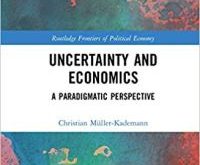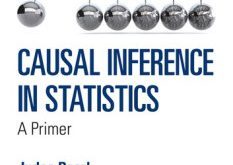Not accounting for uncertainty may result in severe confusion about what we do indeed understand about the economy. In the financial crisis of 2007/2008 the demon has lashed out at this ignorance and challenged the credibility of the whole economic community by laying bare economists’ incapability to prevent the crisis … Economics itself cannot be regarded a purely analytical science. It has the amazing and exciting property of shaping the object of its own analysis. This...
Read More »En kyss med smak av oljeblandad bensin och fett
En kyss med smak av oljeblandad bensin och fett [embedded content]
Read More »Hovern’ engan
[embedded content]
Read More »Modell och verklighet i nationalekonomi
Modell och verklighet i nationalekonomi Nationalekonomi är mer än någon annan samhällsvetenskap modellorienterad. Det finns många skäl till detta — ämnets historia, ideal hämtade från naturvetenskapen, universalitetsanpråk, viljan att förklara så mycket som möjligt med så lite som möjligt, rigör, precision med mera. Tillvägagångssättet är i grunden analytiskt — helheten bryts ned i sina beståndsdelar så att det blir möjligt att förklara (reducera)...
Read More »The intellectual regress of macroeconomics
The intellectual regress of macroeconomics Real business cycle theory — RBC — is one of the theories that has put macroeconomics on a path of intellectual regress for three decades now. And although there are many kinds of useless ‘post-real’ economics held in high regard within mainstream economics establishment today, few — if any — are less deserved than real business cycle theory. The future is not reducible to a known set of prospects. It is not like...
Read More »Dokumentären som renar min själ (personal)
Dokumentären som renar min själ (personal) I alla moderna människors liv behövs det tid för andhämtning och reflektion. Och ibland — när alla möjliga och omöjliga måsten och krav från omgivningen bara blir för många och högljudda — kan det vara skönt att dra sig undan lite grand och slå av på takten för en stund. Alla har vi väl olika sätt att göra det på. Själv brukar jag gå in på Öppet Arkiv och titta på Gubben i stugan — Nina Hedenius underbara...
Read More »On causality and econometrics
On causality and econometrics The point is that a superficial analysis, which only looks at the numbers, without attempting to assess the underlying causal structures, cannot lead to a satisfactory data analysis … We must go out into the real world and look at the structural details of how events occur … The idea that the numbers by themselves can provide us with causal information is false. It is also false that a meaningful analysis of data can be done...
Read More »Alternatives to mainstream economics
Alternatives to mainstream economics [embedded content]
Read More »Levon Minassian
[embedded content]
Read More »Politik och marknad — ett seminarium
Politik och marknad — ett seminarium Behovet av radikal samhällsanalys och ideologikritik har sällan varit större än nu, drygt femtio år efter att tidskriften Häften för kritiska studier först såg dagens ljus. Med utgångspunkt i en nyutkommen antologi med elva forskare diskuteras i tidskriftens anda aktuella trender i vår tids kapitalism. Är USA-imperialismen nere för räkning? Innebär den digitala plattformsekonomin en fjärde industriell revolution? Varför...
Read More » Lars P. Syll
Lars P. Syll





